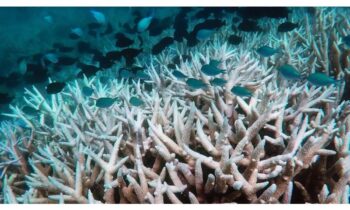
A recent study shows that if human-caused global warming continues to worsen, certain marine species may go extinct within the next century.
For the first time, the study, which was headed by the University of Bristol and published in Nature, compares the responses of microscopic ocean organisms known as plankton during the last major global warming in ancient history with what is anticipated to occur under comparable circumstances by the end of this century.
Large areas of marine life, particularly fish that rely on these organisms for sustenance, were in danger because the plankton could not keep up with the rate of temperature rise.
The findings are concerning because, even with the more conservative climate projections of a 2°C increase, it is evident that plankton cannot adapt fast enough to keep up with the much faster rate of warming that we are currently experiencing and that appears set to continue, said lead author Dr. Rui Ying, who oversaw the project as part of his Ph.D. in marine ecology at the University of Bristol.
“Plankton are the lifeblood of the oceans, supporting the marine food web and carbon storage. If their existence is endangered, it will present an unprecedented threat, disrupting the whole marine ecosystem with devastating wide-reaching consequences for marine life and also human food supplies.”
In order to arrive at this result, the researchers created a new model that made it possible to examine how plankton acted during the last Ice Age, approximately 21,000 years ago, as well as how they would behave in the context of future climatic projections. The modeling work provides previously unheard-of insights and degrees of accuracy by concentrating on a particular plankton type that has existed throughout the millennia.
According to Dr. Ying, “The past is often considered key to understanding what the world could look like in the future. Geological records showed that plankton previously relocated away from the warmer oceans to survive.
“But using the same model of ecology and climate, projections showed the current and future rate of warming was too great for this to be possible again, potentially wiping out the precious organisms.”
196 countries committed to keeping the rise in the average global temperature well below 2°C over pre-industrial levels and working toward a 1.5°C increase under the terms of the Paris Agreement. However, a United Nations assessment released last month cautioned that if governments do not do more to cut carbon emissions, global warming might reach 3.1°C.
Marine ecologist and co-author Daniela Schmidt, a professor of earth sciences at the University of Bristol, has served as the lead author on several reports for the Intergovernmental Panel on Climate Change (IPCC).
Professor Schmidt stated, “This work emphasizes the great risks posed by the dramatically fast climate and environmental changes the world is now facing. With these worrying trends set to worsen, there will be very real consequences for our ecosystems and people’s livelihoods, including fishing communities. So the message is clear—all nations must collectively and individually step up efforts and measures to keep global warming to a minimum.”



